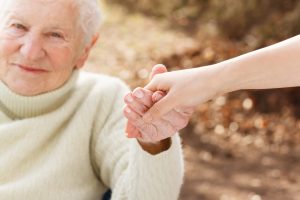 For many the risk of falling and potentially injuring themselves is a very real possibility. And the fear of doing so can cause equally as much stress, anxiety and panic.
For many the risk of falling and potentially injuring themselves is a very real possibility. And the fear of doing so can cause equally as much stress, anxiety and panic.
However, whilst statistics demonstrate that many falls do not result in major harm, a large number of non-injured fallers approximately 47% – cannot get up without assistance. It is therefore essential to evaluate the risks, implement numerous prevention methods, and have Assistive Technology in place to ensure a carer is notified.
In our latest blog post we discuss and outline the varying associated risks and how you, a carer, or family member can prevent the risk of falls.
The Surprising Statistics
Whilst anyone can fall at any time, statistics would suggest that the risk is greater for those aged over 65. That’s 11.4 million people in the UK. It is implied that more than three million of this age group fall every year and whilst many are not subject to injury, one out of 5 may experience broken bones or head injury. This is in turn is likely to make it harder for a person to get around, do every day activities or live on their own.
Unfortunately, it is also suggested that falls account for upwards of 25% of all hospital admissions and 40% of all nursing home admissions.
And whether injury occurs or not, for those who are unable to get up on their own, the period of time spent immobile can affect their health outcome. Did you know that muscle cell breakdown starts to occur within 30-60 minutes of compression due to falling? Additionally, individuals may experience dehydration and pressure sores, and in some cases even hypothermia and pneumonia.
What Are The Risk Factors & Can These Be Prevented?
There are a wealth of factors that can contribute to a potential fall, from simple accidents to a person?s individual health conditions. But most are a combination of factors which can be changed, modified, or monitored including:
- Balance problems
- Muscle weakness
- Vision problems
- Long-term health conditions such as heart disease, dementia, or low blood pressure that can cause dizziness
- Use of medication
- Foot pain or poor footwear choices
- Home hazards such as broken and uneven steps, no handrails on stairs or in the bathroom, throw rugs or clutter
Your Home
Research suggests that 31% of falls occur due to a simple accident or environmental factor. There are therefore a number of things you can change in order to help yourself, an elderly relative, or someone at risk of falls.
Organise your home, with the help of a carer or relative if necessary, so that climbing, stretching, and bending are kept to a minimum. Reduce the risk of trips by removing clutter and trailing wires from any main walkways. Frayed carpets and loose rugs should also be revaluated and removed or secured into a stable position.
Did you know you can even request a home hazard assessment where a healthcare professional visits your home to identify potential hazards and offers other advice?
Strength & Balance
In older age it is often the case that muscles naturally weaken and balance may therefore be affected. Simple activities such as walking ? regardless of distance or time covered ? can aid these two factors vastly. In addition exercise is not only important for your physical health but your mental well-being too.
Many community centres and local gyms offer specialist training programmes for older people wishing to improve their strength and balance. It is a great opportunity to improve these two risk factors as well as meet new people.
There is also evidence to suggest that Tai Chi sessions greatly reduce the risk of falls, so if you can why not give it a go? Placing particular emphasis on balance, co-ordination, and movement this Chinese martial art steers clear of physical contact or rapid physical movements.
Sight & Hearing Tests
If you are concerned about poor vision, don?t just ignore it. Ensure that your eyes are tested and prescriptions are renewed regularly so that any difficulties or issues are highlighted and in turn corrected.
You might also want to undergo regular hearing tests. Simple problems such as an ear infection can severely affect your balance.
Assistive Technology and Falls Management
Unfortunately, as much as we can make an effort to prevent falls they will still occur. And as mentioned above many individual struggle, even when injured, to get up after falling. Designed to provide peace of mind for the individual and their carers, monitors and alarms are essential in homes and care homes across the country.
At Alert-iT we offer a range of monitors which discretely support those at risk from a fall. With a variety of sensors available these unique systems have been designed to detect users falling, wandering, or even suffering panic attacks.
For those less susceptible to falling we can offer a prolonged vacation setting which can alert carers of a failure to return to bed.
Releasing carers from constant supervision all systems are available with an advanced failsafe long range radio pager for fast response, and can alternatively connect with an existing nursecall system.
More Information & Advice
If you are concerned about the risk and potential injury that may be caused by falls, then assistive technology could help and bring significant peace of mind to your everyday life.? Please give our fantastic team a call on 0845 217 9952 or 01530 231215 for more information and advice regarding our Sense-iT range or any other assistive technologies.
Alternatively you can take a look at our full range of Sense-iT alarm and monitors.

